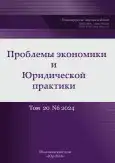The Role of Hybrid Coordination in the Implementation of Social Sphere Output
- 作者: Ogorodnikova E.S.1, Guseva T.I.1, Loginova E.V.1
-
隶属关系:
- Ural State University of Economics
- 期: 卷 20, 编号 6 (2024)
- 页面: 226-232
- 栏目: Management
- URL: https://journal-vniispk.ru/2541-8025/article/view/284600
- EDN: https://elibrary.ru/SOLYTV
- ID: 284600
如何引用文章
详细
The relevance and purpose of the work. The relevance of studying the role of hybrid coordination in the development of the social sphere is due to the need to substantiate a comprehensive model of hybrid coordination of the social sphere. The available data on individual instruments of hybrid coordination need to be summarized and, based on them, a methodology for forming a model of hybrid coordination needs to be developed. The purpose of the article is to study the impact of the intensity of hybrid coordination on the volumetric indicators of social sphere output. The materials and methods of research. The research methodology is based on determining the connection between the output of social sectors and indicators characterizing the intensity of the use of hybrid coordination, followed by comparison of the results obtained in two time ranges «2013–2019» and «2013–2023». The results of the work. As a result of the study, we can conclude that when expanding the range of analysis, there is a moderate increase in the number of regions demonstrating high connectivity between the social sphere output indicator and the intensity of use of coordination within the framework of quasi-market interaction models. Also, with the expansion of the range of analysis, there is a reduction in the number of regions demonstrating high connectivity in the output of social sectors and the use of coordination within the framework of public-private partnerships and the issuance of grants. This circumstance is due to a reduction in the implementation of the designated projects. The Conclusions. It is confirmed that there is a connection between the use of hybrid coordination models and the release of social sectors. This situation is explained by the possibility of expanding the resource base of the social sphere by attracting capital from private companies and the budget during the implementation of public-private partnership projects and grant financing, optimizing costs and attracting public funds with the active use of quasi-market mechanisms.
作者简介
Ekaterina Ogorodnikova
Ural State University of Economics
编辑信件的主要联系方式.
Email: cmb_8@mail.ru
ORCID iD: 0000-0002-8299-6934
SPIN 代码: 1127-0958
Cand. Sci. (Econ.), Associate Professor of the Department of Management and Entrepreneurship
俄罗斯联邦, YekaterinburgTatyana Guseva
Ural State University of Economics
Email: cmb_8@mail.ru
SPIN 代码: 1813-9208
Senior Lecturer at the Department of Management and Entrepreneurship
俄罗斯联邦, YekaterinburgEkaterina Loginova
Ural State University of Economics
Email: cmb_8@mail.ru
SPIN 代码: 3478-0304
Cand. Sci. (Econ.), Associate Professor of the Department of Management and Entrepreneurship
俄罗斯联邦, Yekaterinburg参考
- Popov E. V., Kalmykova O. N., Simonova V. L. Cycles of industry markets and dynamics of development of hybrid structures // Journal of Economic Theory. 2016. No. 2. pp. 110–118.
- Plotnikov V. A. Typification of economic systems: theoretical aspects // Proceedings of the St. Petersburg State University of Economics. 2021. No. 1 (127). pp. 20–26.
- Mau V. Human capital: challenges for Russia // Economic issues. 2012. No.7. pp. 114–132.
- Bessonova O. E. Formation of a new reality: from a quasi-market to a contract distribution // Economic issues. 2017. Vol. 7. pp. 96–113.
- Moskovskaya A. A. Incentives and barriers to attracting non-governmental providers to the provision of social services: Russian and foreign experience // Issues of state and municipal management. 2018. 3. pp. 88–116.
- Orekhova S. V., Safarov M. A. Fiasco of the market and failures of the state: contours of a new model of healthcare in a pandemic // Journal of Institutional Studies (Journal of Institutional Research). 2022. Vol. 14. No. 4. pp. 95–109.
- Murtazina I. R., Vaslavskaya I. Y. Formation of mechanisms of public-private partnership in the industrial sector of the Russian economy // Moscow Economic Journal. 2020. No. 8. pp. 222–230.
- Lepikhina T. L., Uzhegova K. A. Public-private partnership as an institution for coordinating the interests of the state and business in order to implement the concept of sustainable development // Current issues of modern science. 2015. No. 1. pp. 54–58.
- Tkachenko I. N., Meteleva M. A. Modeling of the stakeholder value of a corporate network created in the process of implementing a social responsibility policy. 2023. Vol. 14, No. 3. pp. 44–58.
- Starshinova A.V., Borodkina O. I. Strategies for the sustainability of socially oriented NGOs: the mechanism of grant support // Economic and social changes: facts, trends, forecast. 2022. vol. 15. No. 5. pp. 221–236.
- Ogorodnikova E. S., Plakhin A. E., Khokholush M. S. Evaluation of the results of the introduction of hybrid models for the development of social services in the regions of Russia // The economy of the region. 2023. Vol. 19. No. 3. pp. 753–765.
- Ogorodnikova E. S., Borisova A. A., Guseva T. I. Trends in resource support for the functioning of the organizational and economic mechanism of the sphere of social services // Scientific works of the Free Economic Society of Russia. 2023. Vol. 239. No. 1. pp. 269–290.
- Kotlyarov I. D. On the method of identification of hybrid structures // Vestnik NGUEU. 2015. No. 4. pp. 347–356.
补充文件










